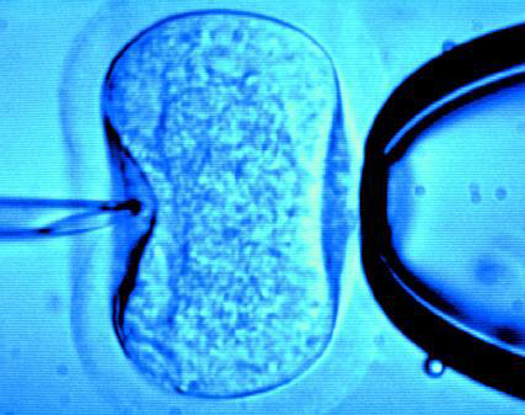

It may soon be legal in the U.S. to modify embryos using mitochondrial replacement therapy (MRT). The FDA is expected to approve the procedure today, according to a press release from the National Academies of Sciences, Engineering, and Medicine and reported by Nature News.
In the past few years, MRT has emerged as a viable treatment for mitochondrial diseases, congenital conditions that a mother passes on to her child caused by mutations that prevent mitochondria from producing enough energy to fuel the body’s cells. There are a few different versions of the procedure, but in essence scientists would replace a mother’s damaged mitochondrial DNA with that of another healthy woman in an egg, which would combine with a healthy sperm to create a viable embryo that could then be implanted in the mother.
While MRT offers a treatment—or even a cure—for previously untreatable conditions, some experts have voiced concerns about the safety and ethics of the procedure. Because researchers still aren’t clear on how mitochondrial DNA interacts with the rest of a person’s genetic code, modified embryos might be at higher risk of other health problems like cancer. And any changes made to a baby’s genome can be passed on to future generations, bringing up the age-old debate of “designer” babies. Some are wary of the identity crises that would accompany children who have three biological parents.
Because of these concerns, the FDA’s decision, made based on a years-long investigation into MRT, comes with a few caveats. The procedure will only be tried on male embryos, since males don’t pass on modified mitochondrial DNA to their offspring. If clinical trials show that it’s safe in males, it could be expanded to females as well. And the procedure will be limited to only those parents facing the highest risk of mitochondrial disease.
The FDA approval may yet be stymied by a new federal regulation, which was tacked on to the 2016 budget, that prohibits the agency from permitting any procedures in which modified human embryos are implanted in women, Nature News reports. When it comes to tweaking the genes in human embryos, the U.S. is more conservative than other countries—the United Kingdom approved MRT almost a year ago—and it’s not clear just how researchers will be able to work around the federal ruling to test MRT in humans. But proponents of MRT hope that FDA approval means further research into the technique will be on the horizon.
2016-02-03 12:52 ET – Correction: for a few minutes, the headline of this story was “FDA Approves Technique To Create ‘Three-Parent Babies’.” The approval is only expected, not complete. Also, the National Academies of Sciences, Engineering, and Medicine collectively issued the report, not only the National Academy of Medicine.
